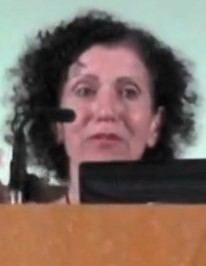| This article is an orphan, as no other articles link to it. Please introduce links to this page from related articles; try the Find link tool for suggestions. (March 2023) |
| Jacqueline Gottlieb | |
|---|---|
 Gottlieb in 2016 Gottlieb in 2016 | |
| Alma mater | Yale University Massachusetts Institute of Technology |
| Scientific career | |
| Institutions | National Institutes of Health Uniformed Services University of the Health Sciences Columbia University |
| Thesis | Contributions of the frontal eye field to smooth pursuit eye movements (1993) |
Jacqueline Gottlieb is an American neuroscientist who is a professor of neuroscience and the Principal Investigator at the Columbia University Zuckerman Institute. Her research considers the mechanisms that underlie cognitive function.
Early life and education
Gottileb was born in Israel. She moved to the United States for undergraduate studies at Massachusetts Institute of Technology, where she studied cognitive neuroscience. She moved to Yale University for doctoral research in neurobiology, and became fascinated by the frontal cortex. Gottileb used neural recordings to investigate frontal eye fields and smooth pursuit eye movements. Such movements are slow movements that are design to keep eyes fixed on an object that moves. After earning her doctorate, Gottileb moved to Uniformed Services University of the Health Sciences in Maryland, where she worked on in vitro slice recordings in the barrel cortex. She spent two years at the University of Health Sciences before joining the National Institutes of Health.
Research and career
In 2001, Gottileb joined the faculty at Columbia University. She studies the fundamental mechanisms that underpin cognitive function, such as decision making and memory. She is interested in how the brain gathers evidence during everyday tasks and when people are curious, as well as disorders that reduce attention, such as depression and drug addiction. In 2019, she was made Director of the Research Cluster on Curiosity, which looks to examine the mechanisms and impacts of curiosity.
Awards and honors
- 2014 McKnight Foundation Memory and Cognitive Disorders Award
- 2015 The Center for Science & Society at Columbia University Presidential Scholars in Society and Neuroscience
Selected publications
- J. P. Gottlieb; M. Kusunoki; M. E. Goldberg (January 1, 1998). "The representation of visual salience in monkey parietal cortex" (PDF). Nature. 391 (6666): 481–484. doi:10.1038/35135. ISSN 1476-4687. PMID 9461214. Wikidata Q48536671.
- Jacqueline Gottlieb; Pierre-Yves Oudeyer; Manuel Lopes; Adrien Baranes (October 12, 2013). "Information-seeking, curiosity, and attention: computational and neural mechanisms". Trends in Cognitive Sciences. 17 (11): 585–593. doi:10.1016/J.TICS.2013.09.001. ISSN 1364-6613. PMC 4193662. PMID 24126129. Wikidata Q38152578.
- Jacqueline Gottlieb (January 1, 2007). "From thought to action: the parietal cortex as a bridge between perception, action, and cognition". Neuron. 53 (1): 9–16. doi:10.1016/J.NEURON.2006.12.009. ISSN 0896-6273. PMID 17196526. Wikidata Q36695674.
References
- ^ "Ada Lovelace Day 2021: Navigating a career in STEM. An interview with Jacqueline Gottlieb, Kirsty Bannister and Natasha Pushkin". Communications Biology. 4 (1): 1187. October 12, 2021. doi:10.1038/s42003-021-02698-7. ISSN 2399-3642. PMC 8511030. PMID 34642462.
- ^ "Jacqueline Gottlieb | Science and Society". scienceandsociety.columbia.edu. Retrieved March 11, 2023.
- #author.fullName}. "How curiosity can supercharge your brain and boost your success". New Scientist. Retrieved March 11, 2023.
{{cite web}}:|last=has generic name (help) - Gottlieb, Jacqueline (February 21, 2023). "Emerging Principles of Attention and Information Demand". Current Directions in Psychological Science. 32 (2): 152–159. doi:10.1177/09637214221142778. ISSN 0963-7214. S2CID 257144044.
- Gottlieb, Jacqueline; Oudeyer, Pierre-Yves; Lopes, Manuel; Baranes, Adrien (November 2013). "Information-seeking, curiosity, and attention: computational and neural mechanisms". Trends in Cognitive Sciences. 17 (11): 585–593. doi:10.1016/j.tics.2013.09.001. PMC 4193662. PMID 24126129.
- "Jacqueline Gottlieb". zuckermaninstitute.columbia.edu. March 6, 2017. Retrieved March 11, 2023.
- "Research Cluster: Curiosity | Science and Society". scienceandsociety.columbia.edu. Retrieved March 11, 2023.
- "Awardees". McKnight Foundation. Retrieved March 11, 2023.
- Living people
- American neuroscientists
- American women neuroscientists
- Israeli emigrants to the United States
- 20th-century American scientists
- 20th-century American women scientists
- 21st-century American scientists
- 21st-century American women scientists
- Massachusetts Institute of Technology alumni
- Yale University alumni
- Uniformed Services University of the Health Sciences faculty
- National Institutes of Health people
- Columbia University faculty